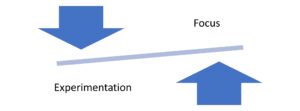Focus Versus Experimentation: Reflections from a Chapter of Organizational Renewal
April 29th, 2021
With the Jim Joseph Foundation’s capacity building grant to JPRO Network now concluded, we are pleased to share learnings and a look ahead from Dr. Laura Herman, Program and Evaluation Manager at JPRO Network.
Most nonprofits go through predictable stages of development: Invention, Incubation, Growing, Sustainability, Stagnation & Renewal, and Decline. JPRO Network playfully referred to itself as a “120-year-old startup” from 2017 through 2020; in reality, we were in the renewal phase. JPRO is a legacy organization that embarked on a period of renewal and experimentation over this four-year period. As JPRO enters its next chapter, one of strengthening and expansion, we are reflecting on the lessons learned over the last four years. Our work included:
To accomplish this, JPRO’s touchstones were focus and experimentation. These two forces are often in conflict; how can one both narrow in and think expansively? Like hot and cold fronts that meet to form a storm, we learned that our most complex yet productive work emerged from the generative tension between these two seemingly opposite forces.

JPRO focused on two complementary objectives:
On the other hand, we needed (and wanted!) to experiment, which required us to:
Even though they were sometimes in tension, experimentation and focus also fueled each other in these years of reinvention. Two examples speak best to the way that JPRO applied these forces: WellAdvised and JPRO19: What Connects Us.
WellAdvised, a free one-hour advising program that provides personalized professional advice from seasoned colleagues, was a completely new model. JPRO learned from a survey of over 1,000 people that professionals were eager for access to advising. We wanted to tap into the “well” of wisdom that exists in our field and to provide valuable opportunities for connection, without the long-term commitment of extant mentoring programs. (JPRO plans to add traditional mentoring to its offerings in the future.) Nothing like this had been done before and we were not sure how people would respond – would seasoned professionals be willing to volunteer their time? Could a limited engagement be useful to the professionals JPRO was trying to serve? How would employers respond to a program that, in part, supports individuals considering next steps in their careers? These and other questions guided the design of the program, and we went through several iterations before arriving at a system JPRO was ready to share with the field. Since WellAdvised piloted in 2018, advisors have provided close to 300 hours of advising and 90% of respondents report having taken an action step after their session.
JPRO19: What Connects Us, JPRO’s first conference after entering the renewal phase of development, was a different type of experiment. We sought to create a new conference experience. The primary goal was to build an atmosphere that would foster connections across many dimensions of diversity, where participants could build their professionals skills and deepen their relationship to the field. We leaned into an unconventional idea: the professional development amusement park. This immersive concept guided decisions about the Connect Lounge, a central atrium that featured activities such as a headshot booth, a meditation space, and a Connect Four tournament. To present the Young Professional awards, we hosted a conversation between the winners rather than the past norm of acceptance speeches. Instead of a traditional plenary, participants learned texts together in havruta, study partners. While these and other elements of JPRO19 were highly experimental, they were guided by JPRO’s desire to build layers of connection, the focus of the conference.
All of JPRO’s experiments have required us to have our eyes open to opportunities that would help us reach our goals. JPRO needed to remain flexible to respond to the changing needs of our audience, but sometimes our desire to be responsive distracted us from our two core objectives. There was occasional tension within the staff team – how much to stay true to our original focus and how much to be nimble and draw outside of those lines? It was a challenge to discern which opportunities would build sufficient momentum to be worthwhile. This was particularly pronounced as JPRO moved quickly in March 2020 to respond to the impact of the pandemic on our professional community. Trying to skillfully determine when to lean into focus and when to lean into experimentation taught us some lessons:
The early part of our “120-year-old start-up” renewal phase bolstered our ability to be responsive and nimble in our work style. While no one was prepared for the rapid changes to every element of our lives when COVID hit, JPRO had already strengthened the muscles required to respond to our audience quickly and with compassion. JPRO was equipped with tools to bring together the field remotely for inspiration and connection. We rallied to feature organizations who could teach others how to pivot in the face of a crisis and to provide resources to professionals that would help them cope, both personally and professionally.
JPRO is now entering a period of expansion and strengthening during which we will work on three priorities: Excellence, Reach, and Access. Each of these areas will enable JPRO to increase opportunities for professional development, networking, and career growth, so that the Jewish nonprofit sector can reach its full potential. Our last chapter taught us to harness the energy that comes from leveraging the tension between experimentation and focus; we learned how to feed (and manage) our appetite for creativity. Equipped with these skills and experiences, JPRO is ready for the next chapter.